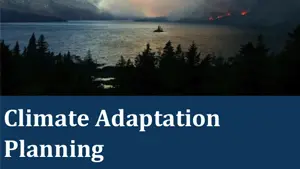 FEMA’s Climate Adaption Planning: Guidance for Emergency Managers is intended to help state, local, tribal, and territorial (SLTT) emergency managers incorporate climate adaptation into emergency management planning efforts.
FEMA’s Climate Adaption Planning: Guidance for Emergency Managers is intended to help state, local, tribal, and territorial (SLTT) emergency managers incorporate climate adaptation into emergency management planning efforts.
The guide discusses climate science in the context of disaster preparedness and explains how emergency managers can help communities develop effective climate adaptation strategies.
Communities may use different terminology around climate resilience and climate adaptation efforts, but for the context of this guide, the terminology is referred to as “climate adaptation planning.”
For the purpose of this guide, climate adaptation planning is defined as a systematic approach used to identify the threats and hazards that might impact a community given plausible future climatic conditions. The process involves assessing the risk posed by these threats or hazards and positioning the community to avoid or minimize the consequences of climate-related disruptions.
Click here to view the resource.




